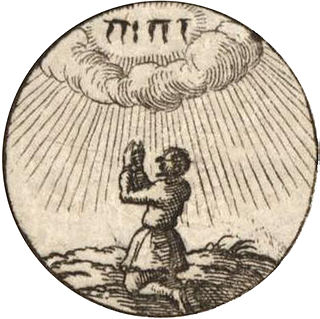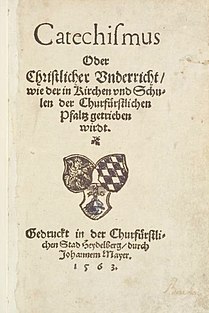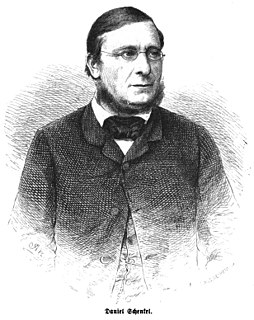Related Research Articles

Gustav Walter Heinemann was a German politician. He was Mayor of the city of Essen from 1946 to 1949, West German Minister of the Interior from 1949 to 1950, Minister of Justice from 1966 to 1969 and President of the Federal Republic of Germany from 1969 to 1974.

The Lutheran Church–Missouri Synod (LCMS), often referred to simply as the Missouri Synod, is a traditional, confessional Lutheran denomination in the United States. With slightly under 2 million members, it is the second-largest Lutheran body in the United States. The LCMS was organized in 1847 at a meeting in Chicago, Illinois, as the German Evangelical Lutheran Synod of Missouri, Ohio, and Other States, a name which reflected the geographic locations of the founding congregations.

Philip Schaff was a Swiss-born, German-educated Protestant theologian and ecclesiastical historian, who spent most of his adult life living and teaching in the United States.

The universal priesthood or the priesthood of all believers is a principle in some branches of Christianity which abrogates the doctrine of holy orders found in some other branches, including the Roman Catholic and Eastern Orthodox. Derived from the Bible and elaborated in the theology of Martin Luther, William Tyndale, and John Calvin, the principle became prominent as a tenet of Protestant Christian doctrine, though the exact meaning of the belief and its implications vary widely among denominations.

Pietism is a movement within Lutheranism that combines its emphasis on biblical doctrine with the Reformed emphasis on individual piety and living a vigorous Christian life.

The Heidelberg Catechism (1563), one of the Three Forms of Unity, is a Protestant confessional document taking the form of a series of questions and answers, for use in teaching Reformed Christian doctrine. It was written in 1563 in Heidelberg, present-day Germany. Its original title translates to Catechism, or Christian Instruction, according to the Usages of the Churches and Schools of the Electoral Palatinate. Commissioned by the prince-elector of the Electoral Palatinate, it is sometimes referred to as the "Palatinate Catechism." It has been translated into many languages and is regarded as one of the most influential of the Reformed catechisms.
The Confessing Movement is a lay-led conservative Christian movement that opposes the influence of liberalism and progressivism within several mainline Protestant denominations and seeks to return them to its view of orthodox doctrine. After the 2019 United Methodist General Conference, the denomination is sharply divided and will likely separate or divide into two or more denominations. An exit plan for congregations and annual Conferences passed the 2019 General Conference and upheld by the Judicial Council.

The Non-subscribing Presbyterian Church of Ireland is a non-creedal Christian Church, which maintains a great emphasis on individual conscience in matters of Christian faith.

Confessional Lutheranism is a name used by Lutherans to designate those who accept the doctrines taught in the Book of Concord of 1580 in their entirety because (quia) they are completely faithful to the teachings of the Bible. Confessional Lutherans maintain that faithfulness to the Book of Concord which is a summary of the teachings found in Scripture, requires attention to how that faith is actually being preached, taught, and put into practice. Confessional Lutherans believe that this is a vital part of their identity as Lutherans.

German Christians was a pressure group and a movement within the German Evangelical Church that existed between 1932 and 1945, aligned towards the antisemitic, racist and Führerprinzip ideological principles of Nazism with the goal to align German Protestantism as a whole towards those principles. Their advocacy of these principles led to a schism within 23 of the initially 28 regional church bodies (Landeskirchen) in Germany and the attendant foundation of the opposing Confessing Church in 1934.

Daniel Schenkel was a Swiss Protestant theologian.

The Bible Presbyterian Church is an American Protestant denomination in the Reformed tradition.

Kurt Scharf was a German clergyman and bishop of the Evangelical Church in Berlin-Brandenburg.

The Prussian Union of Churches was a major Protestant church body which emerged in 1817 from a series of decrees by Frederick William III of Prussia that united both Lutheran and Reformed denominations in Prussia. Although not the first of its kind, the Prussian Union was the first to occur in a major German state.

The Reformed Church of France was the main Protestant denomination in France with a Reformed orientation that could be traced back directly to John Calvin. In 2013, the Church merged with the Evangelical Lutheran Church in France to form the United Protestant Church of France.

Anglican doctrine is the body of Christian teachings used to guide the religious and moral practices of Anglicans.
The Pfarrernotbund was an organisation founded on 11 September 1933 to unite German evangelical theologians, pastors and church office-holders against the introduction of the Aryan paragraph into the 28 Protestant regional church bodies and the Deutsche Evangelische Kirche (DEK) and against the efforts by Reich-bishop Ludwig Müller and the German Christians (DC) since April 1933 to merge the German Protestant churches into one Reich Church that would be Nazi in ideology and entirely lacking any Jewish or Christian origins. As a Christian resistance to National Socialism it was the forerunner of the Confessing Church, founded the following year.

Lutheranism is one of the largest branches of Protestantism that identifies with the teachings of Martin Luther, a 16th-century German reformer. Luther's efforts to reform the theology and practice of the church launched the Protestant Reformation. The reaction of the government and church authorities to the international spread of his writings, beginning with the 95 Theses, divided Western Christianity.
The Protestant Reformed Church of Alsace and Lorraine is a Reformed denomination in Alsace and Northeastern Lorraine, France. As a church body it enjoys the status as an établissement public du culte.
Censorship of the Bible includes restrictions and prohibition of possessing, reading, or using the Bible in general or any particular translation of it. Violators of so-called "Bible bans" have been punished by killing, imprisonment, forced labor, and banishment, as well as by burning or confiscating the Bible or Bibles used or distributed. Censorship of the Bible occurred in historical times and is still going on today.
References

- ↑ The liberal party was a Kirchenpartei (church party), which in German Protestantism is a group nominating candidates in a list for church council and synodal elections and compares roughly to nominating groups in the Church of Sweden.